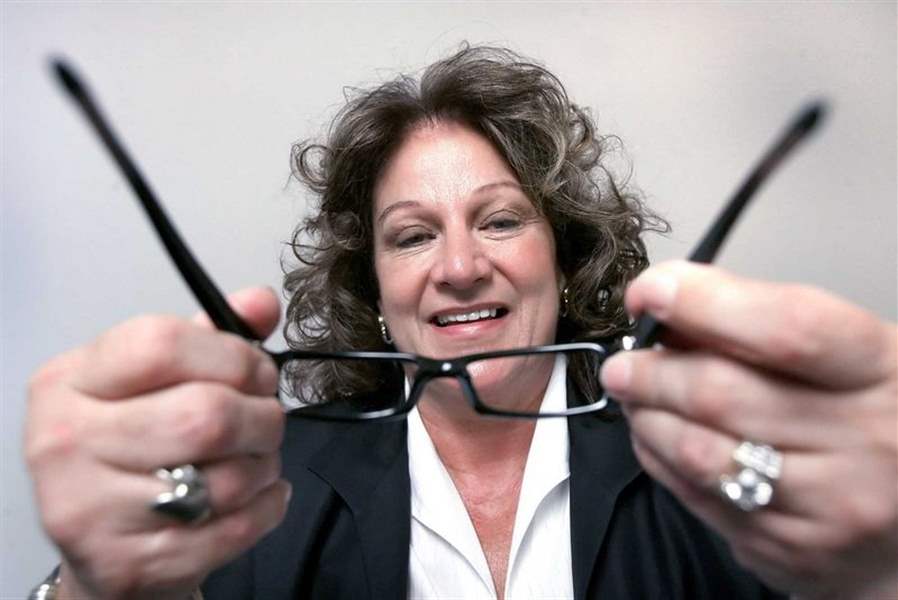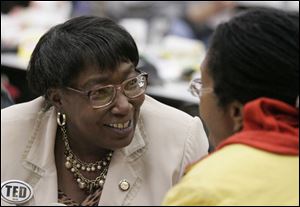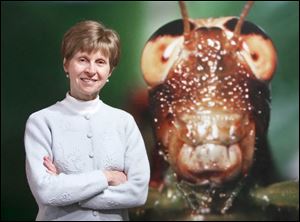
Local women at the top of their field light the way for others
3/18/2007
Mary Martin is CEO of OptiVue.
The Blade/Allan Detrich
Buy This Image

Edna Brown represents District 48 in the Ohio House of Representatives.
That crash and clatter you might have heard earlier this year was probably the sound of Rep. Nancy Pelosi (D., Calif.) breaking through what she called the "marble ceiling" to become America's first female speaker of the House.
Or maybe the sound was applause as historian Drew Gilpin Faust became the first female president of the 371-year-old Harvard University, one of the most prestigious jobs in higher education.
Or possibly it was the reaction as New York Sen. Hillary Rodham Clinton launched a 2008 presidential campaign that could make her the first female president in the nation's history. Senator Clinton is regarded as the most credible female candidate ever to seek the presidency.
Maybe it was all three. Whatever - women around here heard it, and it is especially loud and clear during Women's History Month.
"I think it's obviously a very exciting time," said Anne Baker, PhD, executive director of the Toledo Zoo. "We have had competent women in good positions for many years, but in positions where they weren't so noticeable."
Christa Adams, PhD, president of Owens Community College, has a similarly upbeat view: "It's wonderful being able to watch the changes being made. ... It is a validation that we as people are making progress."

Mary Martin is CEO of OptiVue.
For students - women and minorities in particular - seeing people like themselves achieve such heights "is a message that 'I too can do that,'•" Ms. Adams said in a remark that was echoed by others, among them Lynn Jacquot, director of the YWCA Battered Women's Shelter.
"I'm a social scientist, and we know that role models are very important in terms of people's aspirations and beliefs in what they can attain in this world," she said.
Ms. Jacquot recalled a woman who stayed at the shelter several times and, with her batterer now in jail, is able to turn her attention to personal goals that will improve her life and the lives of her children. "She's feeling she can do things she never could before. She's talking to her daughters about what they can do in the world, so [strong female role models] can't help but be a positive for her and women who want to encourage other women," Ms. Jacquot said.
Seeing women break into the highest ranks of power and influence is particularly satisfying for women who have encountered gender bias.
Louise Jackson said she struggled for months to get a job in public accounting after she graduated from college. Some clients wouldn't accept a woman auditor, she was warned.

Anne Baker is executive director of the Toledo Zoo.
"Women really have come a long way," observed Ms. Jackson, who is now a partner in the law firm Spengler Nathanson and president of the Toledo Bar Association for 2006-2007. Ms. Jackson, who also is a CPA, was one of the first female auditors in Toledo and one of the first women to become a partner in a large law firm here.
Although at 58 Ms. Jackson doesn't expect that the recent women's triple play on the national level will have an effect on her career, "I think it is good for younger women to realize there's hope."
One of them is 21-year-old Emily Resnik of Cincinnati, a senior majoring in psychology and women's studies at Bowling Green State University.
"I think it's really exciting," she said. "Even though women have had the right to vote since 1920, we are finally getting into these positions... It shows that women are strong, they are respected, they are capable."
"I think it builds a sense of 'I can do anything I want,'•" Ms. Resnik added.
Yes, it's great to see women reaching the peak of their fields, and yes it's important for young women to see all the possibilities that are out there, but "it's also sort of disheartening that here we are in 2007 and it's still an issue," said Vikki Krane, PhD, director of the women's studies program at BGSU.
Religion, race, and gender continue to be noted when anyone outside the demographic mainstream achieves great success, she said. "It's double-edged: It's wonderful they've gotten there, and it's important for young girls and other women to see, but at the same time, can't they just go out and do their job?"
We spend too much time discussing what Senator Clinton is wearing, or wondering, as in the case of Mitt Romney, whether the country is ready to elect a Mormon president. Some commentators have even wondered whether the biracial Barack Obama is "black enough" to appeal to African-American voters.
"We should just be looking at the abilities of the individual and not all these other characteristics," Ms. Krane declared.
Ms. Baker of the Toledo Zoo agreed: "It would be wonderful if we got to the point we didn't even need to think about or comment on it - that [equality] was just so much a part of where we are as a society that truly the gender issue would go away."
In her own field, 10 percent or fewer of accredited zoos are headed by women, but "that's up from what it was 15 years ago," she said.
And that slim number may simply be the result of women's late start in the climb up the ladder.
"In my profession, I don't think the lack of women in top positions is a reflection of bias as much as it is a historical holdover" of hiring bias 20 to 30 years ago, Ms. Baker said. Today, "in the business overall, we have more women than men."
She said she never encountered gender bias until her last position. "It was a shock," Ms. Baker admitted, adding that it was subtle and thus difficult to fight - "a lack of support, sort of a questioning of virtually everything I did."
But Ms. Adams of Owens Community College said she has never been treated differently because of gender. "People have accepted me in my leadership," she said.
She pointed out that community colleges, compared with four-year universities, have done a better job of elevating women to the top job. An article in the February issue of the Chronicle of Higher Education stated that in 1986, women made up 8 percent of community-college presidents; in 2006, the figure was 29 percent.
"Excluding two-year colleges," the article reported, "women make up 20 percent of college presidents."
Gender bias remains alive and well, according to Mary Martin, chief executive officer of OptiVue, one of the largest eye care providers in northwest Ohio.
Ms. Martin says she encounters slights in the business world and in the community - people commenting how nice it is "your husband lets you do that," she said, or a luxury car salesman asking if "your husband is going to sign for this."
Assumptions are made about women who hold powerful positions, Ms. Martin said. Insulting labels - you know the words - are slapped on strong women.
"I know it's changing," she continued. "I am excited to see Nancy Pelosi in that position, and Hillary Clinton, and I think it's a start."
"The message isn't there yet, but it's coming. We've come a long way," said Ms. Martin, who served as a medic in the Army.
Similarly, state Rep. Edna Brown (D., Toledo) has mixed feelings about the status of women's rights and opportunities today.
"I think for a long time women were making magnificent gains, but now I'm starting to see that perhaps the gender inequities are starting to creep back in," she said in a phone interview from her office in Columbus.
For example, she said, women attend college in greater numbers today, but aren't equally represented in the ranks of faculty, deans, vice presidents, or presidents. There are more women in nontraditional fields and moving up the corporate ladder, "but we know there is a disparity in salaries between males and females."
And although Ms. Brown hails the examples of Representative Pelosi and Senator Clinton, she doesn't see them as signs that the age of equality has arrived. "Just look at our political voices: We don't have the numbers on the local, state, or national level for females," she pointed out.
"We've made gains, but it's been slow, and I think we may have reached a plateau in some areas," Ms. Brown said.
It was the lack of female role models that changed Sandy Hamilton's career path. Now managing attorney at Advocates for Basic Legal Equality and director of a program that acts as an advocate for nursing home residents in northwest Ohio, she said that, "When I started out in high school and thought about going to college, the only options I thought I had were being a nurse, a teacher, or a secretary."
Ms. Hamilton started her career as a physical education teacher in Florida, then moved to Defiance to become the executive director of a family planning clinic, "not realizing how controversial it was."
As she became aware of the lack of women in positions of authority, "that's when I decided to go to law school," Ms. Hamilton said.
After graduating in 1987, she was elected twice to the Defiance city school board, becoming just the second woman ever to serve on the board.
"It's important for young women to, hopefully, appreciate the opportunities [today]," Ms. Hamilton said, as well as take advantage of those opportunities and fight any move to erode them. "To me, that's what Women's History Month is about - to help realize it wasn't that long ago that women didn't have the right to vote."
Young women, not surprisingly, see things differently. In many cases they've grown up with rights that their elders didn't have.
"I've never been discriminated against," said Emily Breymaier, 17, student body president at Springfield High School and a student representative on the district's board of education. On her application to Ohio State University, she wrote an essay about how women's roles have changed. To her, the accomplishments of Nancy Pelosi, Hillary Clinton, Drew Gilpin Faust, and other women are what you'd expect in 2007.
"America has some a long way. Everything is a lot different," she said. "It's not crossed my mind that I shouldn't be an equal to men."
Contact Ann Weber at: aweber@theblade.com or 419-724-6126.